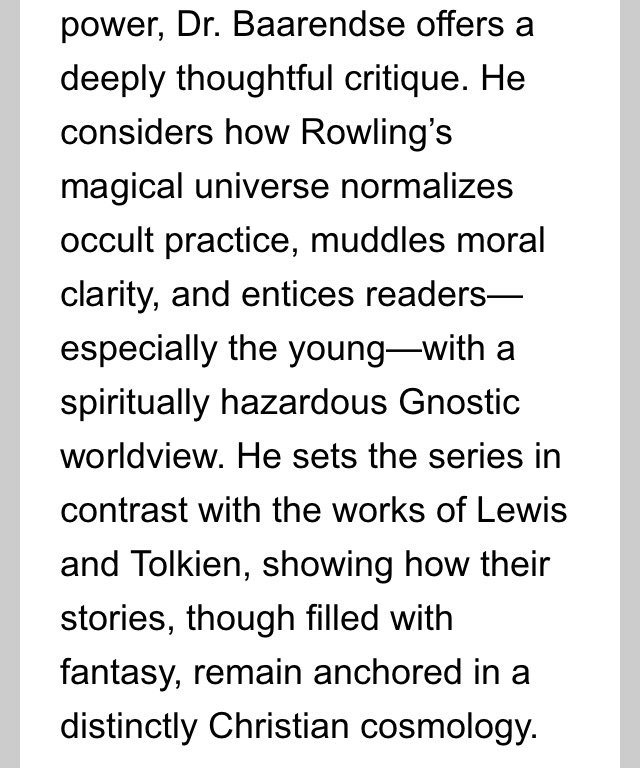
Dear Friends,
Step into my study! Shall I fill you a pipe? Pour you a dram? Excellent!
Perhaps our visit today will not be long enough for an actual pipe and dram, but we shall see.
This morning an email came to my inbox from TruthXChange, an organization I dearly love and have partnered with in the past. They are very much my friends. They have recently been promoting various articles from their archives (like “Androgyny: The Pagan Sexual Ideal” by Peter Jones—an absolute classic). But today they have resurrected Dr. Steve Baarendse’s ill-considered “critique” of the Harry Potter series by J.K. Rowling.
It genuinely disheartens me. I was tempted to ignore it and say nothing, to pretend it didn’t exist. But the introductory language to this email pushed me over the edge:
In addition to the characterization of “deeply thoughtful,” this asserts three things, all of which are objectively and obviously wrong. Harry Potter does not “normalize occult practice.” It does not “muddle moral clarity.” And it does not entice readers with a “spiritually hazardous Gnostic worldview.” My nose for sniffing out Gnosticism has a pretty good track record.
How can somebody bungle this so badly? Well, I have to tell you that I attended the original conference in which Dr. Baarendse gave this lecture. It appeared obvious to me at the time that he had not actually read Harry Potter. Since it is unlikely that a literature professor could so profoundly misunderstand a series of books I simply have to stand by that assumption. It is a kinder assumption than the alternative: that a literature professor does not know how to read.
I have written more on this topic here and here, if you are interested. In short, there is no “occult” magic in the books, and they are full of moral clarity—good versus evil.
I do not have the time right now to give a fulsome reply to the article, but also there is no need. It bears unmistakeable evidence that the author has not, in fact, read the books he is claiming to critique. To a person who has read the books, these “critiques” will seem completely untethered from reality. Because they are.
A major theme in both Lewis and Tolkien (L&T) is their unequivocal condemnation of magic as a tool for manipulation. The ring of power in Tolkien must be destroyed, not used. In Lewis, the “sorcerer’s apprentice” Uncle Andrew is a blithering fool for running with Jadis. But this kind of self-empowering magic is essential to Rowling’s world, where all use magic as a means to advance their own ends.
Middle Earth, if it resembles our earth, is set in an entirely different age, and the Kingdom of Narnia is a completely separate world. There’s no confusion in L&T about the discontinuity between their fantasy worlds and our own. In HP, the line that divides fantasy from reality blurs; the story suggests that the world of wands and broomsticks is the real world. It’s the enemies of magic who are mistaken about reality. In L&T, the reader looks into another world, from a distance. The immediacy of Rowling’s story whispers to the huddled masses of disempowered middle-schoolers yearning to be free: You’re wiser than the Muggles. This world of magical powers is reality, and it’s yours.
Readers of L&T identify emotionally with unmagical protagonists: children and Hobbits. In HP, readers identify with junior sorcerer misfits with a devilish streak of disrespecting adult authority. Harry and his friends are clearly neither the Pevensies nor Frodo & Sam. They’re witches in training, growing up very quickly in their mastery of the occult. It’s essential that Christians grasp fiction’s power to create deep emotional bonds between readers and protagonists. The bonds in L&T are forged with Muggles like us. In HP, readers project themselves (and very powerfully, by all accounts) into the avatar of a warlock coming of age.
J.K. Rowling teaches magic as tool for manipulation? She teaches that witches and wizards are better than and morally superior to Muggles? Harry and his friends are mastering the occult in order to “project themselves” into the “avatar of a warlock coming of age,” and to look down on “Muggles like us”? This is honestly just brutally humiliating stuff to put into print—Baarendse is just telling on himself. The books teach the exact opposite of every one of these assertions, and TruthXChange should take this article down.
The real tragedy to me is that it calls into question the credibility of the organization. TruthXChange is usually a very reliable voice helping Christians to understand the renaissance of paganism happening all around them. But if they can’t be trusted to engage Harry Potter with integrity, people are warranted to wonder what else is unreliable.
Last, I will simply, once again, commend J.K. Rowling’s Harry Potter series to you. Not only will you find one of the most ingenious literary worlds/narratives you’ll ever encounter, but you will find a total repudiation of manipulation, pride and hubris, tribalism, racism and elitism, and the dark and twisted attempts to achieve immortality. And a celebration of self-sacrificing friendship and love, and good triumphing over evil.
And the only children’s literature I’m aware of that includes a Satanic seance featuring a hag and a werewolf bringing back an evil witch from the dead was written by … our beloved C.S. Lewis. So stuff it with this nonsense.
Thanks for joining me for a pipe and dram. Have a wonderful week! We’ll no doubt be reading some Harry Potter aloud around here. We’re finally in the Department of Mysteries in The Order of the Phoenix!






I wish our brothers and sisters of a more fundamentalist bent could understand how damaging this kind of needless culture war windmill-tilting can be to young and/or open-minded believers. I was not forbidden from reading HP when JK started releasing them when I was in high school. I was simply too cool for that kind of thing. But anti-HP was all around my church and broader believing community. When I started having kids several years later and my oldest wanted to read HP, I read them along with her. I was blown away by how fantastic they were and how incredibly wrong - and dishonest! - the Christian critiques of these books were. I've seen these kinds of things stack up and drive folks away from the faith. If Christians are willing to lie about this and that, or at least lack the charity and diligence to know what they're talking about, why should I believe them about anything else? And why would I want to become that kind of person?
I believe the command to love God with our whole mind requires intellectual honesty and integrity. But it SO tempting to take short cuts, create straw-men, repeat talking points without verifying, and fail to engage with ideas in a thorough and honest manner. As Christians we are called to a higher standard and need to ask for the Spirit’s wisdom and power to resist these temptations!